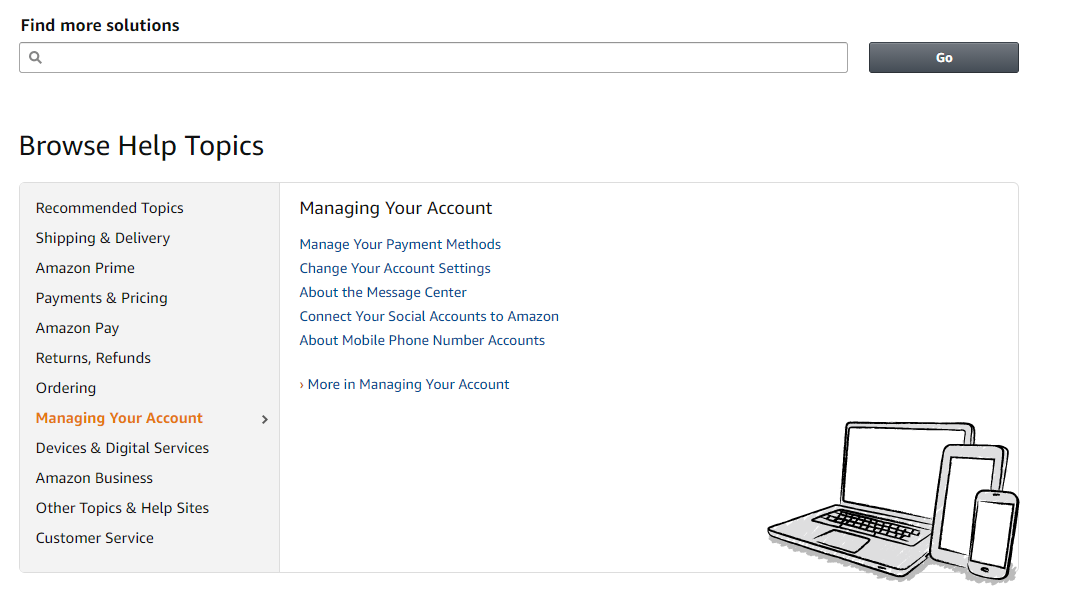Ecommerce companies are working hard to increase profits and reduce their bottom line. The sector is growing, with 95% of all purchases expected to take place through ecommerce by 2040. That being said, the competition is still stiff – 95% of all customers say that customer service is a crucial factor when deciding whether or not to do business with a company.
Helping more customers more quickly during the buying process is crucial, but companies must balance this with the prospect of hiring more support staff. Luckily there is a solution that means you don’t have to fork out for extra manpower: an ecommerce knowledge base.
Here’s an example of the Amazon knowledge base:

Notice the prominent search bar and list of recommended topics. Amazon’s knowledge base is designed to help ecommerce customers without them ever having to reach out to a live agent.
You can’t afford to miss out on implementing your own knowledge base. Prospective customers are searching for relevant information, and 53% of buyers are likely to abandon their online purchase if they don’t find quick responses to their questions. Customers prefer knowledge bases over all self-service channels.
This is where your knowledge base comes in. It should be filled with reams of information relating to your products and services – everything from detailed product information, to shipping times, to returns policies.
Why is your knowledge base important?
Customers are likely to be coming across your knowledge base when they’re frustrated and impatient for answers. You’re offering it to them in place of asking them to reach out to a human.
It hardly needs to be described why your knowledge base is so important. There are many ways that it can enhance your operations so we’ll list just a few of them here.
1. Increased customer support capabilities
Customers don’t want to hunt around for information. Having a dedicated self-service knowledge base means you can help those customers 24/7, providing quick access to the information your customers are searching for.
Access to a knowledge base is basically instant, when compared with the average wait times for email, phone, and live chat. 90% of customers rate an immediate response as very important when it comes to customer service, defined as within less than 10 minutes.
Raising your customer support game has instant results. 93% of customers are likely to make repeat purchases with companies who provide them with excellent customer service. It’s a sad fact of life that your agents will be busy helping your other customers, and a knowledge base is the perfect solution to help deflect those queries that don’t require the intervention of a human.
Customer service is what sets the good companies apart from the bad companies. Think of it as an added value. In today’s competitive industry, everyone can provide the best product, but not great customer service. – Charles Vallena, Co-owner, Foretec Philippines
2. Improving Customer Experience
The Global Consumer Survey Report 2019 recommends that businesses make investing in the Customer Experience a priority. How people feel when they interact with your business is an important part of acquiring new customers, reducing cart abandonment, and improving overall customer satisfaction. 78% of customers have backed out of a purchase because of a poor customer experience.
Learning how to interact with customers is something that anyone starting any business must master ~ Marc Benioff, co-founder – Salesforce
Customers now expect an online knowledge base and very few customers want to wait to speak to a real live human. Customers also want quick answers to their questions and they won’t be willing to wade through pages and pages of information. A well-functioning search bar can help your customers find the answers to their questions.
Your knowledge base should be user friendly and context-sensitive, surfacing relevant content when your customers need it.
Also Read: Top 8 ECommerce Customer Service Best Practices to Follow
An intuitive knowledge base software to easily add your content and integrate it with any application. Give Document360 a try!
Get Started
3. Better visibility in search engines
SEO ranking is critically important for ecommerce companies. Your knowledge base articles should be written to include the exact keywords that your customers are using to search for information on the web.
The content of your knowledge base will contribute to your SEO ranking, since customers will be spending time on these pages. Search engines like Google will take into account the time that customers spend on your knowledge base pages and include them in the search results.
Over time, your knowledge base content will have the ability to attract new customers to your ecommerce site.
4. Enhanced onboarding for new customers
Businesses can increase customer retention rates with a knowledge base. When you win over a new customer for the first time, they are likely to have lots of questions. You can offer a better onboarding experience by sharing your knowledge base with them. However, 90% of customers think that companies can do better when it comes to onboarding.
Sharing your knowledge base has the advantage of engaging your customers, which is important when you think that highly-engaged customers make purchases 90% more frequently, spend 60% more per transaction and are three times more valuable than other customers.
Having a go-to resource for questions will ensure that more customers are onboarding successfully and engaging with your brand.
5. Improve morale for customer support teams
A knowledge base can boost the morale of your support team by centralising key information all in one place. Your support reps have more time to support those customers who need it, and they won’t be repeating basic information on a regular basis. Having fewer customers to deal with results in reps who are less stressed and working in a more positive environment.
As your company grows, it becomes even more important to have a centralised repository of information to keep all your teams on the same page.
When you onboard new reps, your knowledge base is a valuable resource for getting them up to speed. This reduces training time and the learning curve for new agents, thereby lowering recruitment and induction costs for the business.
It’s important to regularly add new customer support queries as content, so you keep expanding the remit of your ecommerce knowledge base.
What to include in your knowledge base
Provide all the information you can in your ecommerce knowledge base. This includes:
- Product information
- Managing your orders
- Managing your account
- Returns & refunds
- Dispatch & delivery
- Payment, pricing & VAT
Keep it short and simple so you don’t overwhelm your customers with information. Stay with one topic per page and make sure you surface the most popular queries.
Final remarks
A knowledge base is a valuable resource for both customers and staff in your ecommerce business. From improving customer service, to boosting staff morale, to enhancing the customer experience, a knowledge base is a must-have. Knowledge bases are the future, especially when you consider that 40% of customers now prefer self-service over interacting with a human.
Creating content is just the first step. You must ensure your knowledge base is contextually linked throughout your ecommerce site and your customers know where they need to go to find answers. Invest in a knowledge base today and start upping your customer service game.
An intuitive knowledge base software to easily add your content and integrate it with any application. Give Document360 a try!
Get Started




 –
– 

